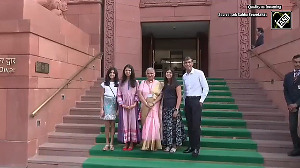
Is Munna Ganjhu part of the system -- social and political -- we all live in?
Ganjhu, 40, is not capable of answering the question. He is unlettered. He does not understand politics. He smiles more than he speaks. It appears he is happy.
This correspondent decided to spend a day with him when they met on the Ranchi-Patna highway. Between Hazaribagh and Ranchi, the highway covers around 100 km, passing through the dense forest of the North Karnpura Valley full of mahua and sal trees.
This highway is Jharkhand's lifeline. It runs through industrial towns like Ranchi, Hazaribagh, Jamshedpur and Dhanbad and connects the state to its neighbours -- Bihar, Orissa and West Bengal.
The state-owned Central Coalfield Limited and private steel major Tata Iron and Steel Co Ltd mine for coal in the forest. Jharkhand is one of the largest producers of coal in India.
There are hundreds of villages scattered all over the forest. Most residents are tribals. Jharkhand was carved out of Bihar to meet the aspirations of its tribal population. Jharkhand means 'the land of jhar (tree)'.
Statehood came after over a decade of struggle. Tribals form 73 percent of the electorate in Jharkhand.
Ganjhu's village, Simmer Beda, is about 40 km from Ranchi, the state capital.
 His village in the Chuttu Pali valley. It is the place where freedom fighter Sheikh Bhikhari and 20 people were hanged by the British Army during a tribal uprising in 1850.
His village in the Chuttu Pali valley. It is the place where freedom fighter Sheikh Bhikhari and 20 people were hanged by the British Army during a tribal uprising in 1850.
A memorial dedicated to the freedom fighters on the highway is where Ganjhu takes rests every day for 10 minutes while on his way to Ranchi. The memorial is on a mountain peak and a fall from here will take one about 100 meters down in the forest.
Ganjhu is not afraid of the mountains or the terrain. He travels 40 km to Ranchi and back every day with his bicycle loaded with sacks of coal. "I was born here. I know every tree of the jungle. This is my home. Are you scared in your home? This forest is our god," says Ganjhu.
His village has about 50 houses, all made of mud and hay, their walls plastered with cow dung and mud. There are beautiful patterns on the walls drawn by women during the traditional Sohrai festival. All residents of the village belong to the Ganjhu caste.
His day starts at around 5 am. Ganjhu's wife Phoolo and three daughters collect coal from the nearby open cast mine. They bring home (officials say they steal) raw coal. Sometimes they have to fight with security guards. They used to pay a bribe of Rs 10 to Rs 20. The bribes stopped after Jharkhand Mukti Morcha leader Shibu Soren became Union coal minister last year.
If the JMM wins enough seats this time, Soren will be chief minister.
The women and children carry raw coal on their heads to the village every day. They burn it partially to ready it for use as household fuel. It is also used in industrial furnaces.
Early in the morning, Ganjhu packs the coal in small sacks. One sack contains 30 to 40 kg. There is nothing in his village to weigh the sacks. He loads about 10 sacks on his bicycle and walks towards Ranchi town.
If he gets a customer on the way, he sells the coal for Rs15 a sack. If he sells it in Ranchi, a sack fetches him Rs 35 to Rs 40.
"It is very hard. Carrying the sacks up on the mountain and coming down...it is very difficult. Only we know how we do it," says Ganjhu.
He leaves home at around 7 am and reaches Ranchi around noon. He is back home by late evening. "I have been doing this every day for five years or more," he says. The villagers began selling coal illegally after the state government cancelled licences of private coal dealers in the state seven years ago. The officials argued that people in the state do not need coal as domestic fuel as cooking gas is in abundance. But the huge sale of illegal coal indicates that most still use coal as fuel.
The villagers began selling coal illegally after the state government cancelled licences of private coal dealers in the state seven years ago. The officials argued that people in the state do not need coal as domestic fuel as cooking gas is in abundance. But the huge sale of illegal coal indicates that most still use coal as fuel.
It's ironical. The people of Jharkhand, the largest producer of coal, buy it in black. Almost every day there are reports in local dailies about coal being smuggled out of the state. Trucks full of stolen coal are seized almost every day. Villagers say only those who don't pay bribes are caught.
A tribal state has made no difference to the lives of tribals. Ganjhu, however, sees no reason to be unhappy. "We have been living like this since ages," he says.
His village has no school, no hospital or road. Electricity is a privilege even in towns. The villagers collect water from a natural pool that is increasingly getting polluted due to mining. For medical treatment, Ganjhu goes to the CCL Hospital in Charhi, about 30 km from home. Since he is not an employee of CCL, he needs to beg the hospital officials for treatment.
Ganjhu lives in a democratic country. An election should provide him an opportunity to teach the leaders, who have failed him a lesson. But he cannot do that.
Nobody has come to seek his support or vote. His village is in the middle of a forest that is home to the Communist Party of India-Maoist. It has announced a poll boycott. Graffiti on a dilapidated government building says parliamentary democracy, privatisation and globalisation are robbing the poor.
Ganjhu has nothing to lose. That is why many of his tribesmen have joined the outlawed group.
He says he is unaware of who is contesting from his constituency. The last time he voted was about a decade ago.
Ganjhu is happy with what he earns daily. He drinks a bottle of Handia -- liquor made of rice -- in the evening. "Us ke baad kuch yaad nahin rahta (After that I forget everything)," he says.
Healdine image: Rahil Shaikh






 © 2025
© 2025